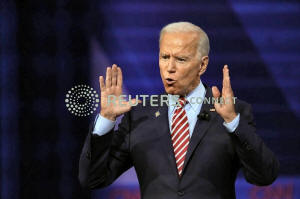Biden campaign asks Facebook, Twitter and Google to take down Trump ad
 Send a link to a friend
Send a link to a friend
 [October 12, 2019]
By Elizabeth Culliford [October 12, 2019]
By Elizabeth Culliford
(Reuters) - U.S. Democratic presidential
candidate Joe Biden's campaign sent letters over the last week to
Facebook Inc, Twitter Inc and Alphabet Inc's Google, asking them to take
down a social media ad from President Donald Trump which the Biden
campaign said contained false claims.
But the three companies said that the ad, which alleges that the former
vice president promised Ukraine $1 billion if the country fired a
prosecutor investigating a company linked to his son Hunter, did not
violate their site rules.
Trump has repeatedly made allegations, without evidence, that Biden
engaged in improper dealings in Ukraine.
The Biden campaign's letters, seen by Reuters, said it was putting the
companies "on notice about the absolute falsity of these claims."
As campaigning for the November 2020 U.S. election kicks up a gear,
Facebook and other social media companies have been under pressure to
police election-related content. U.S. intelligence agencies found the
sites were used in a Russian campaign to influence the 2016 presidential
election, a claim denied by Moscow.
Facebook recently explained that it does not intend to send politicians'
posts or ads to its third-party fact-checkers.
In a letter responding to the Biden campaign, Facebook said that
politicians are not allowed to share a previously debunked viral hoax in
ads, but their direct speech was ineligible for fact-checking.

"Our approach is grounded in Facebook's fundamental belief in free
expression, respect for the democratic process, and the belief that, in
mature democracies with a free press, political speech is already
arguably the most scrutinized speech there is," Facebook's head of
global elections policy Katie Harbath wrote in the letter.
Biden campaign spokesman TJ Ducklo called Facebook's decision
"unacceptable."
The Trump campaign said the ad did not contain any false claims.
"Our ads are 100 percent accurate," said Trump campaign spokesman Tim
Murtaugh. "The truth hurts and it's not a surprise that Biden doesn't
want anyone to hear it."
Google, whose video-streaming service YouTube ran the ad, confirmed that
it had on Thursday received the Biden campaign's letter. Twitter also
said it had received the letter and intended to respond.
[to top of second column]
|

Democratic 2020 U.S. presidential candidate and former Vice
President Joe Biden participates in a televised townhall on CNN
dedicated to LGBTQ issues in Los Angeles, California, U.S. October
10, 2019. REUTERS/Mike Blake/File Photo

Both YouTube and Twitter told Reuters that the ad did not violate
their policies.
DEMS DEMAND FACT CHECKS
Senator Elizabeth Warren, another front-runner for the Democratic
nomination, attacked Facebook's policy in a series of tweets on
Monday.
"Facebook already helped elect Donald Trump once because they were
asleep at the wheel while Russia attacked our democracy - allowing
fake, foreign accounts to run ad campaigns to influence our
elections," wrote Warren, who in March called for the break up of
Facebook, Alphabet and Amazon.
The Democratic National Committee's deputy war room director, Daniel
Wessel, said in a statement: "Any false ad should be fact checked
and removed, including this one. Facebook owes that to its users."
The ad, which also attacks "media lapdogs," was rejected by CNN,
according to media reports, while NBCUniversal refused to accept it
in its current form when the Trump campaign tried to place
additional cable buys, a NBCUniversal spokeswoman said. It has
previously aired nationally once on NBC stablemates MSNBC and Bravo.
CNN did not reply to a Reuters request for comment.
"TV stations and social media companies, like Facebook, should
refuse to air these baseless ads, which are purposefully meant to
deceive voters," said Sabrina Singh, a spokeswoman for Democratic
presidential hopeful Senator Cory Booker.
On Thursday, Lee Goodman, a Republican and former chairman of the
Federal Election Commission, told CNBC that he did not think
Facebook should be tasked with determining the truthfulness of
political campaign ads.
Some social media platforms, such as photo-sharing site Pinterest
and popular Chinese-owned video app TikTok, do not allow political
advertising.
TikTok last week explained its own ban on political advertising,
saying that they do not fit into the experience it aims to provide
to users.
(Reporting by Elizabeth Culliford in London, Editing by Rosalba
O'Brien)
[© 2019 Thomson Reuters. All rights
reserved.]
Copyright 2019 Reuters. All rights reserved. This material may not be published,
broadcast, rewritten or redistributed.
Thompson Reuters is solely responsible for this content. |